From Alopecia To Post-Covid - Six Women Share Their Experience Of Hair Loss

Between periods, the menopause and, well, so many other subjects, sometimes it seems as if there's an endless list of conversation topics that are deemed just too uncouth for us women to talk about openly - female hair loss included.
But, as with every 'taboo' topic, a conversation about the reality of suffering from female hair loss is way overdue.
The question is: Why should a condition that affects a massive percentage of men, be so taboo for women? And, like anything, just how much worse is it when you feel completely alone with it?
It's time to speak out.
After an uncomfortable altercation at this year's Oscars between Will Smith and Chris Rock where the comedian referenced Jada Pinkett Smith's shaved head, the world's focus has moved to Pinkett Smith's own experience of hair loss as a result of alopecia.
The latest celebrity to open up about how alopecia has affected her life, in recent years Pinkett Smith has turned to social media to share her diagnosis with the condition. 'It was one of those times in my life where I was literally shaking with fear,' Pinkett Smith said on an episode of her chat show 'Red Table Talk'. 'That's why I cut my hair and continued to cut it.'
Actor Kristin Davis aka SATC's Charlotte, has also publicly discussed her own struggles with thinning hair, saying to WWD:
'It was very fine, like it had gone away, there was just hardly any hair there… when I tried to do something or had to go somewhere I was like, "Where is my hair?"'
With NHS figures suggesting that around half of women over the age of 65 will experience female pattern hair loss, not to mention a whole plethora of other forms of hair loss affecting women everywhere, surely it's time to shake that taboo off once and for all and get talking.
But why is our hair falling out? We turned to the pros...
What Causes Female Hair Loss?
'There are several possible factors that may result in hair loss for women and not all are easily managed,' says Head of Research and Development at Leonor Greyl, David Brooks.
1.Genetics
'Genetics and or intense emotional or physical stress can be very difficult to manage. In the case of ‘Bad Genetics’ you will probably get your best results from using something over the counter such as minoxidil (a medication used for the treatment of male-pattern hair loss).
'Unfortunately when you stop using minoxidil it’s possible that you can more than likely experience even worse hair loss than before you began using it,' explains Brooks.
2. Diet
'Other causes of female hair loss may be nutritional deficiencies or using certain medications. These can easily be remedied by correcting your diet or stopping the use of medications (consult your doctor before stopping).'
3. Over-Processing And Styling Hair
'Over processing your hair, dandruff and scalp psoriasis and wearing too-tight hairstyles is too often something that is really overlooked. The obvious solution is to stop! You’re just pulling at the roots and thus weakening them over time. The hair will just fall out and not grow back.'
4. Childbirth And Menopause
'Childbirth and menopause are another possible cause of female hair loss,' says Brooks. 'The rapid rise and fall in hormone levels can be very difficult to manage on many levels.'

Can Coronavirus cause hair loss?
Although not officially listed as a symptom of Coronavirus, a wave of women have come forward with claims of hair loss as a result of having the virus.
'Patients who have suffered prolonged and heavy onset of coronavirus about 2-4 months prior are now reporting severe hair loss,' says hair loss and growth expert Laura Sagen.
'Hair loss is not on the list of the official symptoms, so at first it’s easy to become alarmed around potentially one more symptom to start looking out for. Notably, it occurs after the onset of the disease rather than prior. This can be a result of severe stress that patients who suffered a severe or prolonged form of coronavirus, otherwise known as telogen effluvium – stress-related hair loss.'
With more and more women experiencing dramatic hair loss on top of other symptoms it seems to be more than mere coincidence.
But, as any women that have suffered from hair loss themselves could tell you, the sterile medical explanation of hair loss rarely correlates to the human experience of being a woman that's losing their hair.
We spoke to six women about their personal experiences and how they're giving female hair loss the finger, one day at a time...
Jenny Pitt - Hair Loss As A Side Effect Of Coronavirus

It was mid-March when I was admitted to Kingston Hospital with Coronavirus. I’d been really ill for two weeks with a high temperature and awful gastric pains but it had been getting worse and worse. Eventually, I was taken to A&E and put on oxygen for four days.
Once I left hospital, I thought it was all over. But, suddenly, I started to feel a bit rough again. I was breathless and my scalp began to burn and feel painful to the touch. I was washing my hair everyday as usual and as I combed it I started to notice that it just would not stop falling out. There were handfuls of it in the shower all around my feet. I just thought, ‘Oh my god’.
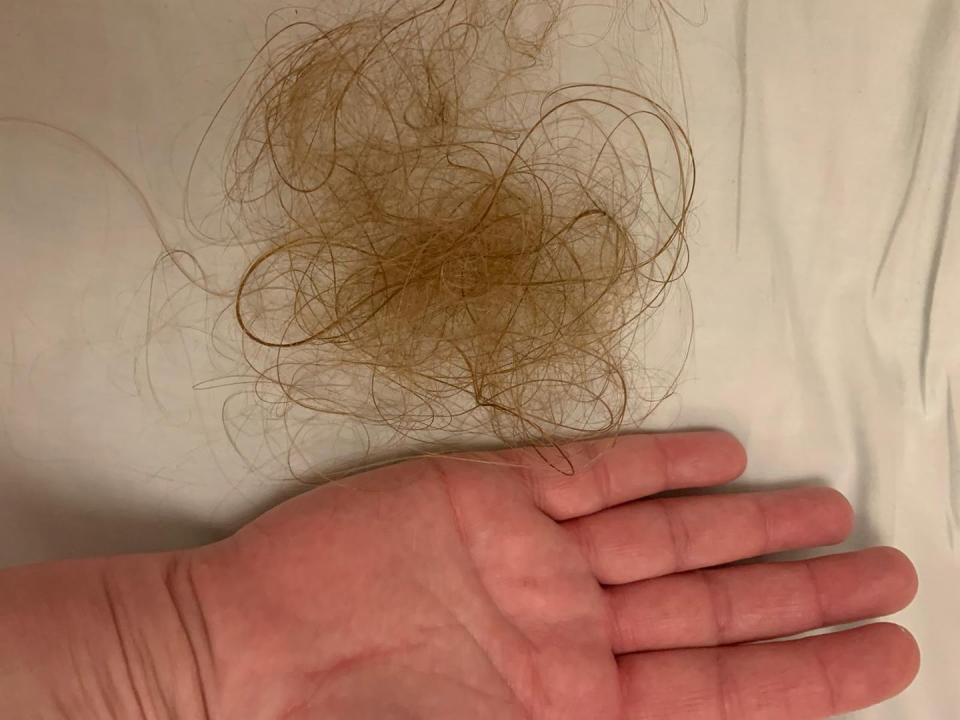
I hoped it was maybe a one off experience. I’d had so many bad things happen to me in the weeks before that I just thought I’d get on with it and not worry. But it continued to happen. Everyday for a month whenever I would comb or brush my hair it would fall out and cover my bedroom floor. It just kept shedding.
It got to the point where my scalp was so sore it was too painful to even lie my head on my pillow. Before I had Coronavirus my hair was my pride and joy. I’d get a half head of highlights done every eight weeks and get blowdries before a big night out. I’m a mum so it was my way of looking after myself. Feeling it falling out and seeing it look so thin around my hairline was so distressing. I just couldn’t believe how much was falling out. I’d been so lucky to avoid going to intensive care so to feel like I was ill all over again eight weeks later was horrible. I had this awful fear that it wasn’t going to stop and I would have to wear wigs. I thought I was going bald.
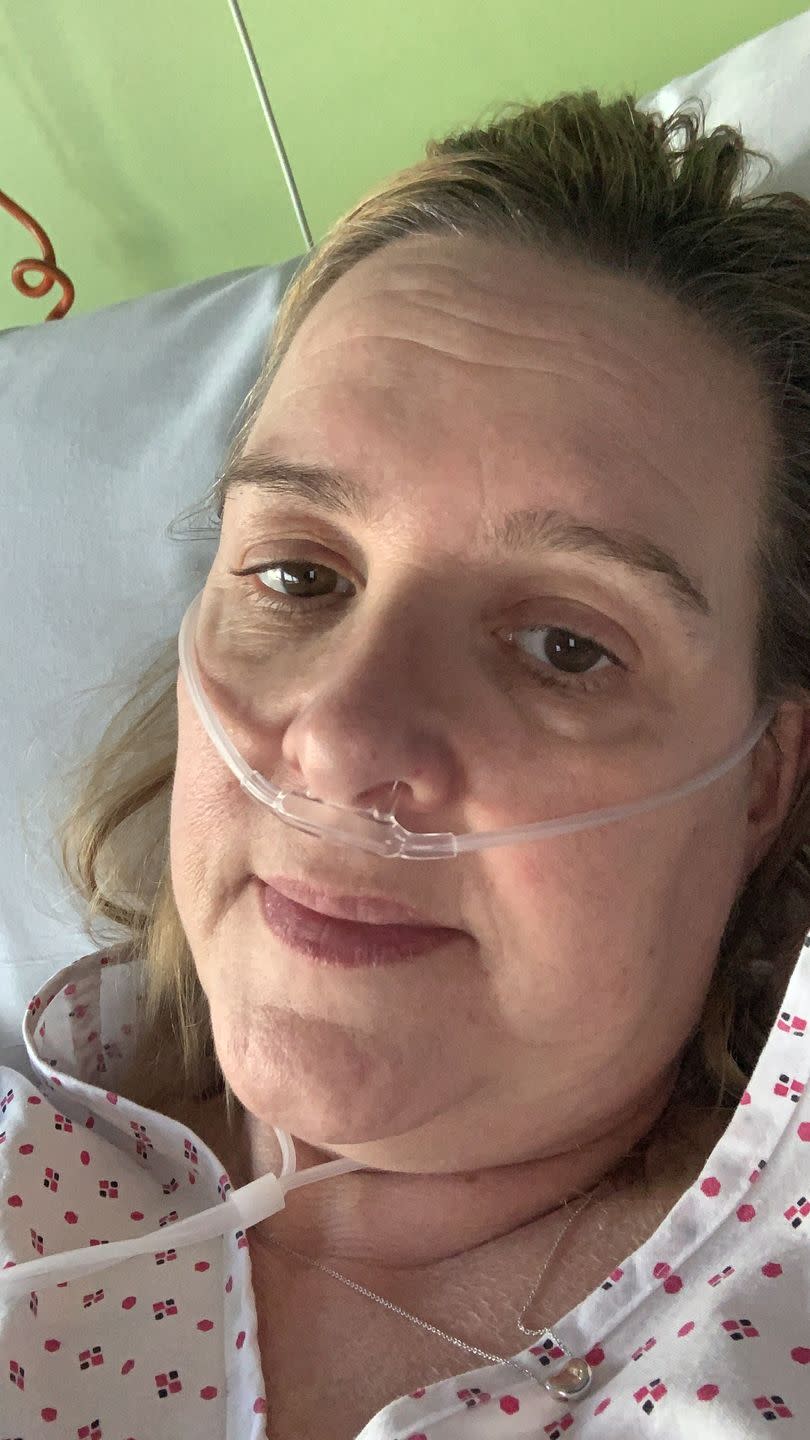
I felt so unwell and my hair loss had become so dramatic that I started panicking that I still had Coronavirus. I decided to go to the doctors. I thought that the physical stress of being ill might have lead to alopecia but my GP examined my scalp and without any bald patches he concluded that wasn’t the case. ‘I think this is Covid’, he said. He told me that the high temperature I’d had for so long as a result of Coronavirus had caused my hair to fall out.
Then, as quickly as it started, four weeks later it stopped. I’d had a month of wondering if it would ever end, clumps of hair falling out, avoiding brushing or anything that might make it worse and suddenly it just stopped. It looked so straggly and thin - I knew I had to cut it. Any sort of hair dyeing was fully off the cards but I thought a good haircut might at least take the weight out of it. My hairdresser cut it to my shoulders - chopping off the dead hair felt so cathartic.
Now it’s started to grow back in tufts that are grey and mousey brown. Before I would have been horrified to have grey tufts of hair sticking up but now I’m just so excited that it’s growing back I’m showing them off. The relief that I’m not going bald and I can see that my hair is recovering is positive enough for me.
Gina Knight - Telogen Effluvium Brought On By Post Natal Depression

After I had my first baby, I started getting post-partum hair shedding, which is totally normal. When you're pregnant you retain all your hair and it's shiny and thick and lovely, and then once you give birth it starts to shed. It can seem quite extreme because you haven't been shedding your hair naturally over time like you would when you're not pregnant, but it's totally normal.
I was expecting the shedding, but after three to four months, the hair loss was becoming really concentrated in certain areas. The crown of my head and the sides of my hair had fallen out and it was very noticeable and when I went to the doctors, they assumed that because I'd had a baby that it was just the usual shedding.
I saw three or four doctors because I wasn't happy with their diagnosis. Because I'm black, doctors assumed my hair was falling out because of bad hair practices like wearing tight braids or a weave which couldn't have been more off the mark. At the time I was a hair blogger and really into holistic hair treatments, not to mention I'd never had braids or a weave.
After that, doctors tried to diagnose me with almost anything, including a fungal infection! They prescribed me topical creams that didn't work, and the next stage was to test a patch of my hair. I already felt self conscious about the patches of hair I was missing, I didn't want to give up another chunk.
Instead, I did loads of research and decided to cut out any hair styling products and simply waterwashed (where you just rinse your hair under water) for six months. I knew then, that if my hair kept on falling out that it was because of something happening internally, not because of a product I was applying externally.
It took almost a year before I was properly diagnosed with stress-related alopecia as part of my post-natal depression and PTSD. It turned out that my body's way of dealing with it was to reject my hair.
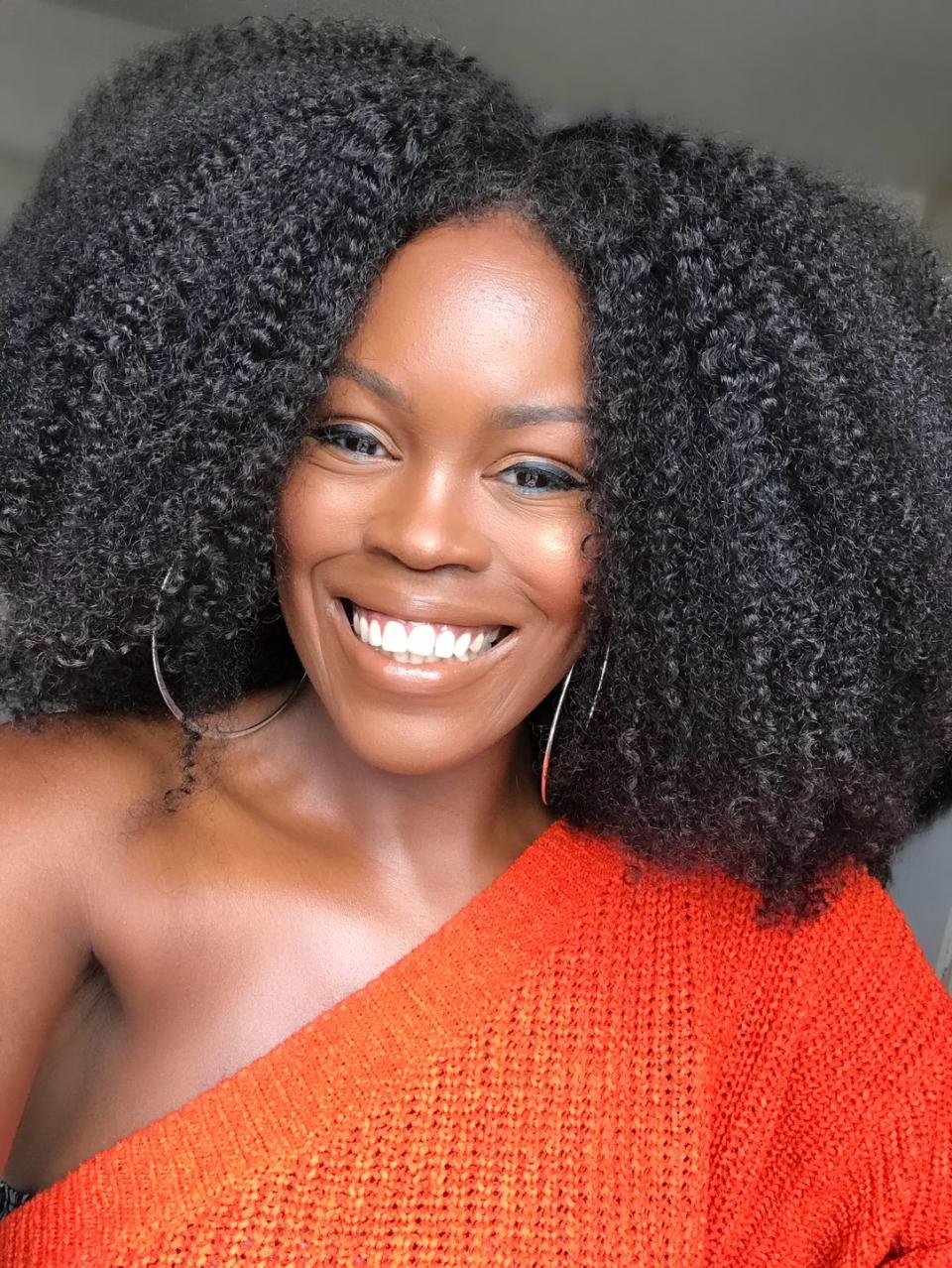
I had a new baby to look after and knowing my hair was falling out just added to the stress. There was a point where my post-natal depression got so bad that the doctor wanted to prescribe me anti-depressants. But as much as the hair loss was bringing me down, as a new mum I just didn't want to feel out of it. A lot of people choose to take medication and that's totally their choice, but for me I didn't want to be in a haze at such an early stage of my child's life, or ever really.
After the diagnosis people kept saying 'Why don't you just shave your head?', because I'd done that previously. But, there's a big difference between choosing to shave your hair, and having to shave your hair. You feel so out of control.
Instead, I started playing around with wigs. Having been known as a hair blogger with big hair, losing it knocked my confidence. I'm an extravagant person and I still wanted to be fabulous without damaging my hair even further.
At the time most wigs used eurocentric textures or looked so fake, so I started making my own instead. As well as wearing and creating wigs for other women who suffer from hair loss, I also practice a lot of meditation to help deal with my anxieties. They haven't disappeared totally, they never really do, but the way I deal with them now is a lot clearer.
I've just had my second baby and the hair loss is always in the back of my mind. The shedding has started again and the areas that lost more hair before are still much thinner. People often think that hair loss is something you can put a cream on and you'll be cured but a lot of the time that's not the case. Sometimes, you just have to face that it's never going to grow back and deal with that.
Juliet Cooke - Hair Loss Caused By Alopecia

Nine months ago, whilst blow drying my hair, I noticed a small circular bald patch on my left temple. I had no idea what it was and instantly called the doctors surgery hoping to book an appointment. I was told over the phone that it sounded like I had something called Alopecia and the doctor couldn't see me for a few weeks, but there's no cure, so I wasn't an urgent case compared to others.
The first thing I did was go on the internet to see what this mysterious thing called Alopecia was, having no real idea myself. The internet was covered with photos of bald people and those destructive words printed everywhere, no cure...
The panic I felt in that moment was so overwhelming and actually indescribable. The thoughts rushing through my head wouldn't stop… "What if I lose all my hair?" "Who will ever want to look at me?" "How will I look at myself?" It went on and on.
Over the months to follow, I lost hair every day, whether it was in the shower coming out in handfuls or waking up with it all over my pillow. My parents and I tried everything to stop it, injections, steroid creams, immunologists, trichologists, dermatologists… a never ending stream of appointments which always resulted with the same answer -I had Alopecia, no one knew why, what it was from or how I could stop it.
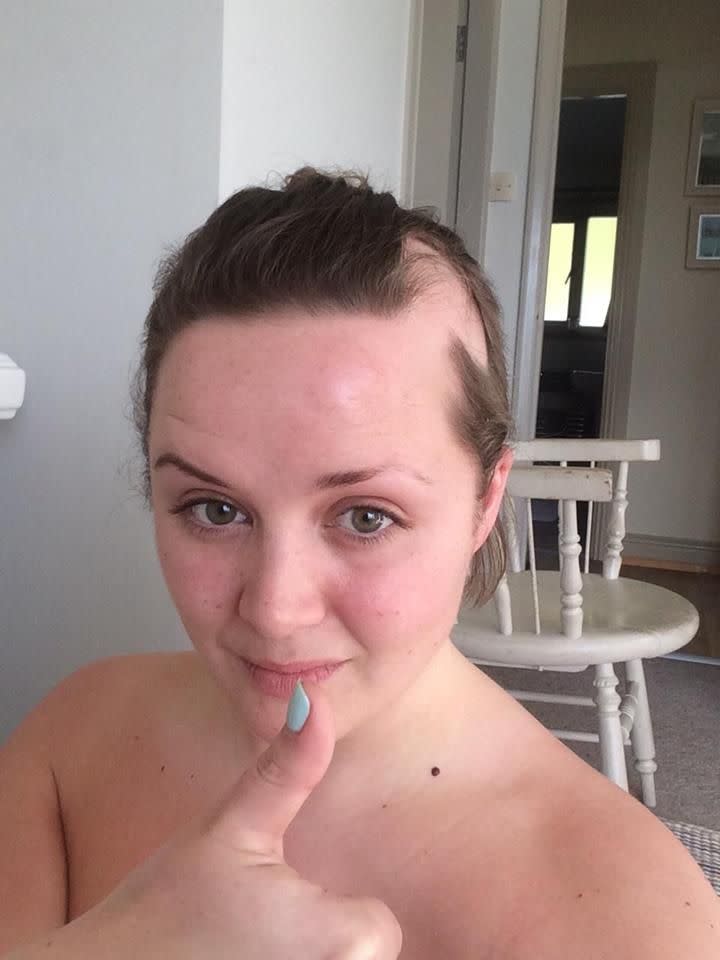
There was only one thing to do in my mind and that was to keep a smile on my face and pretend it wasn't happening. Putting on a front is one of the easiest things to do, I had done plenty of times in the past so why not now. Unfortunately there's only so much you can mask before the emotion comes pouring out at the seams, and it did.
The day I started to lose my eyebrows was the day I lost all hope. I hit rock bottom. I couldn't get up in the mornings or show my face in public. It wasn't that I was crying every day, because I honestly didn't have the energy or even care enough to do that. I just felt totally flat. I couldn't see a way out of the big black hole and I'm not sure at that moment in time if I really cared enough about myself to even try. Alopecia is not only a physical condition but it massively affects your mental state as well. Depression is another thing people rarely speak about, but it's finally getting the media attention it so greatly deserves.
One day, about 2 months ago, I made the decision to turn my life around and get myself back on track. I was sitting at my family's holiday cottage in Strangford and the sun was glimmering on the lough and in through the window and it felt like for the first time I had energy and even a little hope. I decided it was time to share my journey with everyone so I didn't have to hide anymore.
I sat down, switched on my iPad and started to talk, explaining to people what I had personally been going through, what Alopecia was, showing them my hidden bald patches, and then sang a song as music had helped me through the toughest of times. I posted it on Facebook before really thinking. I had never been a public person, but for some reason, there was no doubt in my mind that my act of self-help had to be done in a very public way. We are all different, and this was my way of dealing with it.
I finally found the courage to beat Alopecia to the punch and I shaved my head, taking back the control the condition had stolen away from me. They say stress causes Alopecia, but let's be honest losing your hair causes stress and there's only one way to stop that cycle.
Emily May Armstrong - Hair Loss Caused By Trichotillomania
I'm Emily, a 24 year old PhD student living in Glasgow studying plant science and I've been living with Trich for 15 years.
Trichotillomania is a compulsive body-focused-repetitive-disorder, a sub-type of OCD. It's characterised by a compulsion to pull, or remove hair; most commonly from the head, but it can also involve eyelashes, eyebrows, or pubic hair.
I was first diagnosed with Trich when I was nine years old, when I suddenly lost all the hair from my head. I'm 24 now, and although it gets worse in peaks and troughs, you're never really free from the urge. Or, you just pick up bad habits, like smoking, to get through it.
Trich is under-researched in the UK, with the NHS pretty pushed for resources to try and treat it. I was referred to CBT (cognitive behavioural therapy) when I was 10, which just made me more anxious and depressed. Trying to identify Trich-triggers is incredibly difficult; they can be emotional, physical, situational and differ vastly between individuals. For me, currently it's mostly when I come up against confusing stuff in my PhD research; anxiety and stress also induce it.
Trich is mostly considered untreatable; there's not enough research into the mental, or neurophysiological mechanisms of action to really underpin the cause. I suspect it works in a similar way to any other addiction; a stimulus like a small amount of pain induces a dopamine response, a pleasurable feeling. After a while, your physiological urge for the dopamine hit overpowers your reasoning to stop.
The most isolating part of Trich is trying as hard as you can to stop, you don't want to do it, but you just can't. It'd be like asking an alcoholic to quit drinking, if they had wine bottles attached to their hands 24/7. It feels impossible sometimes.
I'm in a rough patch with Trich at the moment; missing about half of my hair. Luckily I've 'trained' myself to go for less noticeable areas, meaning for the most part you can't tell from most angles, or unless you're really looking.
It's a massive self-esteem destroyer, I know I'm guilty of isolating myself from friends when I'm feeling especially vulnerable, turning down nights out and otherwise enjoyable social events. It's a vicious cycle, you feel depressed, you lose your hair. You've lost your hair, so you feel depressed. I've been suicidal over it before, no doubt about that.
I've never worn a wig, the remaining hair I do have is thick and really curly so it tends to hide things for me. I feel if it significantly progressed and I couldn't control it any more, then I almost definitely would. The high quality ones are very expensive though, which is a barrier for a lot of sufferers. I'm considering shaving my hair at the moment; but I know it'd be impossible for me not to pull the re-growth entirely.
Women's hair loss is still so taboo because the socio-economic system we exist under puts unwarranted and unnecessary 'value' on physical appearance and social status, regardless of gender. Until we can liberate ourselves from this patriarchal and repressive system profiting from our insecurity, it will always be a taboo to stand out from 'the normal', which contributes to a lot of mental health problems across the board.
I'm trying to embrace my differences; I've got a long way to go.
Hannah Robinson - Hair Loss As A Result Of Polycistic Ovary Syndrome
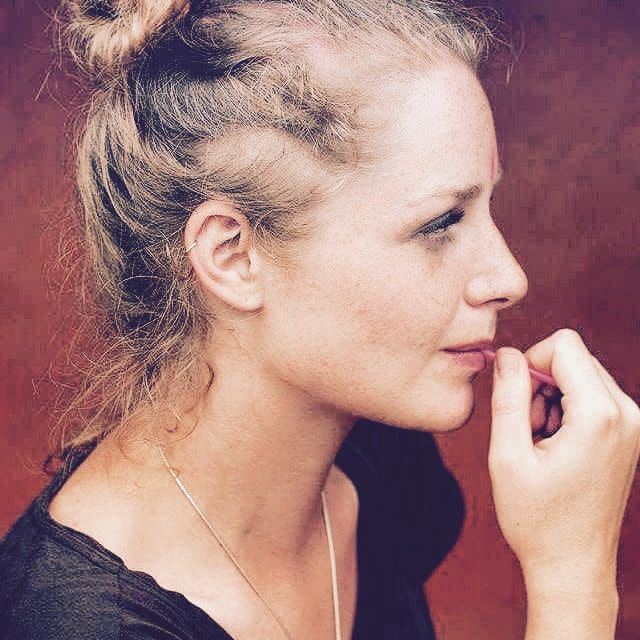
I started to lose my hair when I was about 13 years old.
I didn't notice at first as it was a gradual thinning, but once I realised I was losing my thick, red-golden hair, it was devastating. I had always taken my hair for granted, and had received compliments my whole life for it. Suddenly I was a teenager with hair loss, which makes an already difficult period of life even harder.
I found out I have PCOS (Polycystic ovary syndrome) coupled with insulin resistance, which were the causes of the hair loss. This was over 12 years ago and unfortunately for me not much was known about the condition, which affects so many women. All the GPs and specialists I saw were middle aged men, who were dismissive and often clueless about what was going on. I was told there was really not much to be done, and put on the pill which was supposed to balance things out. At one point I was even told not to worry over something as trivial as hair loss.
It was hard going through my teenage years with very thin hair. I never had any bald spots but at times it was so thin you could see my scalp easily, and if I wore my hair loose it looked like only a few wispy strands.
Nobody seems to understand how it makes you feel, what a negative impact it has on your self-esteem and confidence. When somebody has 'a bad hair day' they mean the whole day is a bad day - that's how it feels everyday as somebody with hair loss. All my friends would be styling their hair and dressing up for nights out and I would be panicking about how to make myself not look like I was balding.
Thick hair is a sign of youth, health and vitality - it's something everyone strives for. We're bombarded with adverts for hair thickening products, so to have such thin hair, you feel unattractive, unhealthy, and abnormal, especially when all your friends have thick hair.
Thick hair and femininity are intrinsically linked. Cutting your hair off or shaving your head as a women is seen as a rebellious, daring move, or plain crazy (remember Britney's meltdown?). But think of all the attractive male celebrities with bald or shaved heads. Thinning hair is seen as a masculine trait, so when a woman suffers from it, it can make you feel less of a woman.
I personally love short hair on women, I cut my own hair very short a couple of times. But it's hard to shake off that feeling that somehow you've failed as a woman, because you don't have luscious flowing locks. The amount of times I've had guys ask me if I was a lesbian when I had short hair just illustrates the fact that we live in a world where people judge even your sexuality by what your hair looks like!
My hair has become slightly thicker in recent years due to trying out some other medications, and I have recently started using Regaine foam for women. I've had to come to terms with the fact I will never have thick hair, but it still gets me down now and then, especially when I go through periods of stress and it thins again. I found that about 6 months after I was hospitalised whilst travelling in Africa, and after the 2015 earthquake in Nepal (I was a volunteer there at the time) my hair suddenly thinned again, which is apparently common after traumatic events.
Your hair is such a part of your identity that it's difficult not to be affected negatively by losing it. Mine also changed colour as it thinned so I'm no longer the red-head I once was. It's good to know that it's being talked about more now, and hopefully the stigma around being a woman with hair loss will gradually disappear.
Julia Esgate Christmas - Alopecia Brought On By Genetically Inherited Auto Immune Disease

I first noticed a patch of hair missing when I was doing a ski season in France, aged 19 and living away from my parents for the first time.
I was drying my hair and I felt it. After pretending to be fine with it I cried a lot that night when I went to bed. I went to the resort doctor the next day and he informed me it was due to stress and not looking after myself properly. He was right, I was working every day and out having fun most nights. He informed me there was nothing I could do about it but wait for it to grow back and to look after myself and my diet.
I was gutted, as my hair has always been my safety blanket. Luckily I could cover it up with the rest of my hair, however I was constantly paranoid that someone would be able to see it – especially when I tied my hair up.
Eventually it grew back, and the new hair was super curly and soft when the rest of my hair is just a little wavy. After thinking this was it, it struck again in my first year of University aged 22 on the opposite side of my head. I didn't notice this until one of my colleagues at my weekend job asked, very tactfully, if I'd noticed.
The patch got larger and I went to the doctor again, who informed me that because I have a family history of auto immune disease (my mother has rheumatoid arthritis) this may have affected my hair loss. Once again, there was nothing to be done except take care of myself and wait for it to grow back. Again, I was so self-conscious of it being seen by other people. It's still growing back now and I have to straighten the curl down.
Hair loss is not spoken about enough; it's assumed that it doesn't happen to young people. I've tried to speak as openly as possible about it with my friends and others to erase the stigma surrounding alopecia areata as it can happen to anyone.
A few of my friends have rung me to tell me that it's happened to them and they knew I'd suffered so they'd ask for tips and the only advice I can give is; take care of yourself as much as possible, talk to people about how it's affecting you and never brush your hair when it's wet!
You're not the first and you won't be the last!
You Might Also Like

